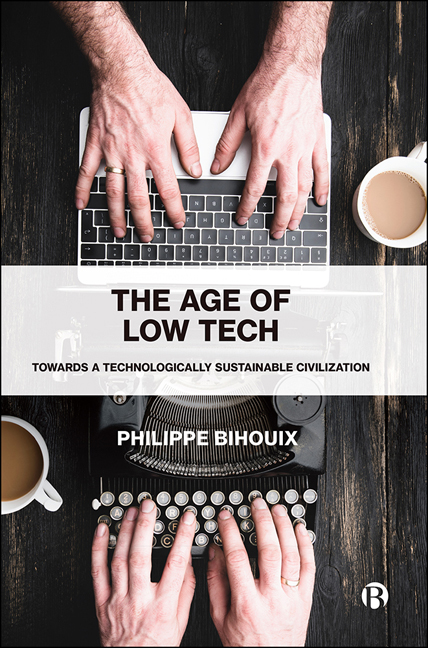Book contents
- Frontmatter
- Contents
- List of Figures and Tables
- Acknowledgements
- Preface to the English Edition
- Prologue: The Mad Dance of the Shrimps
- Part I The Rise and Fall of ‘Engineering Miracle-Workers’
- Part II The Principles of Simple Technologies
- Part III Daily Life in the Era of Simple Technologies
- Part IV Is ‘Transition’ Possible?
- Epilogue: A Dream If Ever There Was One
- Notes
- Index
Epilogue: A Dream If Ever There Was One
Published online by Cambridge University Press: 19 March 2021
- Frontmatter
- Contents
- List of Figures and Tables
- Acknowledgements
- Preface to the English Edition
- Prologue: The Mad Dance of the Shrimps
- Part I The Rise and Fall of ‘Engineering Miracle-Workers’
- Part II The Principles of Simple Technologies
- Part III Daily Life in the Era of Simple Technologies
- Part IV Is ‘Transition’ Possible?
- Epilogue: A Dream If Ever There Was One
- Notes
- Index
Summary
The world has gone crazy. ‘They’ have gone crazy, and if it continues this way, we will eventually go crazy too! This ‘progress’ that we fail to stop takes daft and unexpected forms. Now, in summer, on Pornichet–La Baule beach in France, a small motorized machine cleans the sand to remove pieces of shell in order to prepare the beach for tourists…. Who could have made such a decision? Elected officials afraid of a class action lawsuit by bathers whose feet have been scratched? Consultants who have benchmarked practice in Cannes or Biarritz? And did nobody point out to them that the sand is partly composed of pieces of shell?
Things have gone too far. We might as well admit it, we won't save the planet, or at least a civilized humanity on the planet, by turning off the tap when we brush our teeth and relying on our miracle-working engineers and businessmen for the rest. It is time to take our destiny back into our own hands.
What does this mean in practice?
Let us resist the sirens on all sides who promise us that we can have the best of all worlds, with no change in comfort, mobility or consumption, while not continuing to pollute – the salesmen who claim ‘how green is my method!’ No, we can no longer think that the circular economy, renewable energies and a few other tweaks here and there will allow us to continue to consume like pigs, to produce and throw away like slobs.
On this Earth, unfortunately, any action has an impact. As Barry Commoner wrote: ‘There ain't no such thing as a free lunch.’ When there was no electrical grid and sperm whale oil was still used for lighting while waiting for petroleum, life was precarious for whalers, when, before the invention of the harpoon gun, it was necessary to harpoon the Leviathan by hand. And Herman Melville's Captain Ahab cried out “For God's sake, be economical with your lamps and candles! not a gallon you burn, but at least one drop of man's blood was spilled for it.”
- Type
- Chapter
- Information
- The Age of Low TechTowards a Technologically Sustainable Civilization, pp. 161 - 164Publisher: Bristol University PressPrint publication year: 2020



